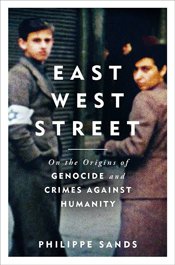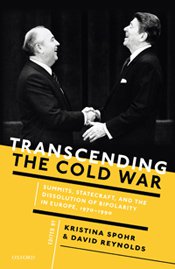Published in British Academy Review, No. 29 (January 2017).
The print version of this article can be downloaded as a PDF file.

For example, you can watch a video of the event held by the British Academy in November to showcase the four titles shortlisted for the 2016 Baillie Gifford Prize for Non-Fiction. Philippe Sands talked at length about his book East West Street: On the Origins of Genocide and Crimes Against Humanity (Weidenfeld & Nicolson, 2016) – which went on to win the prize. He revealed the origins of its innovative structure, including advice he received during the years of working on it: ‘At one point I said to my agent in London “Maybe this is two books; maybe it’s just too complex to tell a personal story and a big political legal story.” And she said “Absolutely not; the difference of this book is that you’ve got to keep them together.”’
Also available on the Academy’s website (via www. britishacademy.ac.uk/fellow-talk) are recordings of Fellows of the British Academy in conversation on matters relating to their work and interests. Here are three examples.
What’s wrong with a Bill of Rights?
The British Academy has been publishing a series of briefings on the UK’s relationship with the European Convention on Human Rights, and on the implications of proposals to replace the Human Rights Act with a Bill of Rights for the UK. To accompany the publication in August 2016 of the briefings on the implications for Scotland and for Northern Ireland, the Academy posted a recording of a conversation between the two reports’ authors – Professor Christine Bell FBA and Professor Colin Harvey. They suggested that the proposals seemed to underplay the complications that would arise from the devolution settlements that now exist for different parts of the UK. Professor Bell observed: ‘I’ve never really been able to work out whether the apparent legal illiteracy in some of the proposals and documents was naivety, or in fact because this isn’t really being played out as a legal argument but a political one. I suppose as a lawyer that’s a bit disturbing. And also as a citizen with a stake in things working coherently and legally and lawfully, it’s disconcerting to see the legal niceties and complications being almost ignorantly by-passed. And aside from the legalisms of whether consent is needed from the Scottish Parliament, the Scottish Government has been fairly clear that it is. And it seems to me that as a political matter that puts us in the realm of constitutional crisis – in that if we have a constitutional dispute which the constitution does not have the tools to resolve, then that would seem to me a classic definition of a constitutional crisis.’
Listen to conversation recording
The briefings on Scotland and on Northern Ireland (published in August 2016), and those on Wales and on the UK’s international human rights obligations (published in November 2016) can be found here.
Warming tales of Cold War summits

In a conversation recorded in July 2016, the former BBC diplomatic correspondent, Bridget Kendall, talked to Dr Kristina Spohr and Professor David Reynolds FBA about the book they have edited, Transcending the Cold War: Summits, Statecraft, and the Dissolution of Bipolarity in Europe, 1970–1990 (Oxford University Press, 2016). In a fascinating discussion of how world events could be shaped by the personal interactions between leaders, Bridget Kendall described how difficult it was for journalists just to find out what was going on at these Cold War summits – with the more limited communications technology at that time, and under pressure to file a story. ‘Often, the simple lexicon of a summit dominated, because you had to grasp something. So, “the handshake”. Or two people standing on the steps together. And some simple message.’ And she said the summit leaders were aware of this. ‘When Mikhail Gorbachev first met Reagan in Geneva, it was November 1985. And Gorbachev was intensely irritated that Ronald Reagan turned up without a hat on, whereas he – being a Russian who takes the cold seriously – had on his homburg. And he felt he had to take it off. And he didn’t really want to: he thought it was ill-advised because of the weather. But given the symbolism that the press would grasp, it was really important that there was parity. And similarly, I remember Raisa Gorbacheva telling us later that she was very put out that Nancy Reagan had so many outfits. And she used to collaborate with one particular Soviet designer to try to keep her end up, because obviously they wanted to make a new statement on the world. I remember she said “Nancy Reagan has so many image makers, stolko image makerov” – they didn’t even have a Russian word for it – “I handled it on my own. It was very hard for me to keep my end up.” So this visual geometry was intensely important in those days. And I think that was partly because the press couldn’t quickly grasp anything more complicated.’
Listen to conversation recording
Can we count on the polls?
In a conversation recorded in September 2016, Professor John Curtice FBA talked to the British Academy’s Chief Executive, Alun Evans, about the performance of the opinion polling industry during the three recent close contests: the 2014 Scottish Referendum, the 2015 General Election, and the 2016 EU Referendum. In that last case, Professor Curtice suggested that perhaps the pollsters succumbed to the presumption that ‘surely at the end of the day the country isn’t going to vote leave’, and during the referendum campaign they constantly refined their methods in ways that tended to skew the figures towards ‘Remain’. Nevertheless, he explained why opinion polling always had a crucial role to play. ‘Our understanding of what lies behind the Brexit vote, what lies behind Trump, what lies behind Marine Le Pen, is the result of survey research. That’s what tells us that it’s people with relatively few educational qualifications, older people, people who are culturally challenged by immigration, people who are concerned about the economic consequences of globalisation. Leaving aside the headline-grabbing horse-race aspect, opinion polling – together with much more broadly academic survey research – is crucial for enabling us to understand why people are doing what they’re doing, and therefore ensuring that politicians of all political persuasions are adequately informed about the messages that come out of the ballot box.’
Listen to conversation recording